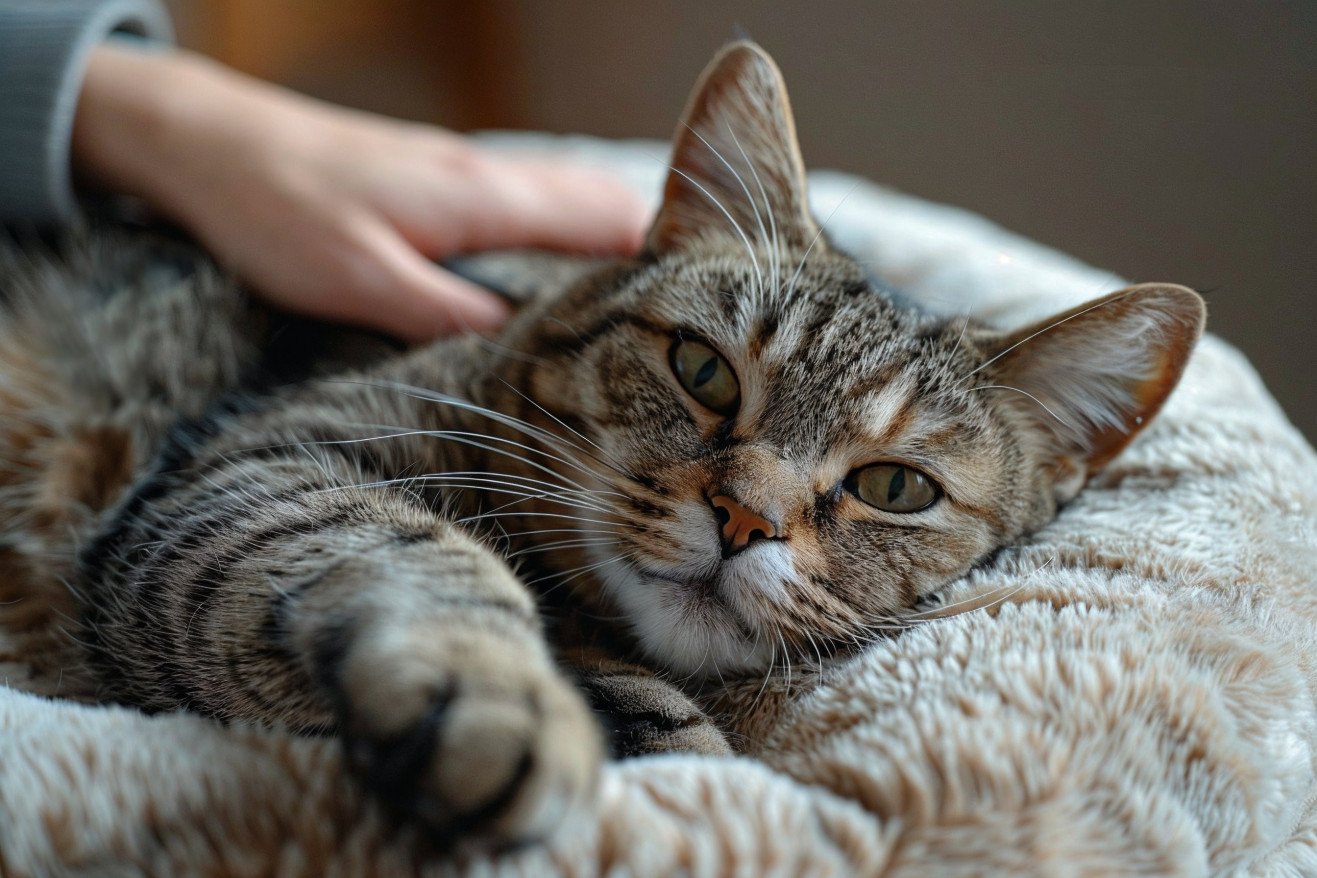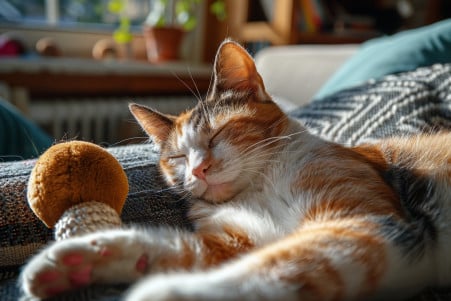How to Know If Your Cat Is Dying: What to Look For and How to Help
19 May 2024 • Updated 17 May 2024

If your cat is showing symptoms such as a loss of appetite, weight loss, weakness, or difficulty breathing, it may be a sign that your cat is dying – but there are ways to understand what's happening and help them feel better. While it can be hard to come to terms with, common signs that a cat is dying include a loss of appetite, weight loss, weakness, incontinence, difficulty breathing, and a lack of interest in things they once enjoyed. By paying close attention to your cat and working with your vet, you can determine the best course of action.
Although it's never easy to deal with this sad reality, we'll go over information from veterinarians and studies on pet health to help you recognize some of the signs that your cat may be nearing the end of their life. Knowing what to look for can help you feel more confident in the decisions you make about your cat's care and make sure that they're as comfortable as possible during this time. We'll also go over how to give your cat palliative care and how to prepare for the end of their life so that you can enjoy the time you have left with them.
How can you tell if your cat is dying?
How to Comfort a Dying Cat
When a cat is dying, it's important to make sure that they are comfortable and that their needs are being met. To ensure this, you'll want to make sure that they are in a warm, quiet area with soft bedding that is away from bright lights and loud sounds. You'll also want to make sure that they have access to their food, water, and a low-sided litter box in case they need it.
Comfort your cat by spending time with them and engaging in activities that they enjoy, such as petting, brushing, or playing with toys. While PetMD notes that cats may purr more frequently when they are dying, you can still comfort them with gentle touch and attention. Make sure that they are also able to rest when they need to.
Keep in close contact with your vet to make sure that you are managing any pain or other issues that may arise. This may include making sure that you are giving them any medications that have been prescribed and following any other palliative care recommendations. While it's a hard decision to make, you may also need to consider euthanasia if your cat's quality of life has significantly decreased. Your vet can help you understand the euthanasia process and when it may be time to consider it.
In the end, focusing on your cat's needs, working with your vet, and being present during this time will help you make sure that you are supporting your cat as much as possible. While it's a difficult time, your vet will be able to help you through this process.
How to Deal With the Loss of a Cat
It's important to remember that the feelings you have after losing a cat are normal and valid. You should allow yourself to feel whatever you need to feel and express your emotions in a healthy way. According to The Spruce Pets, the stages of grief include denial, anger, bargaining, depression, and acceptance.
To help you move through these stages, you can try journaling, creating memorials or keepsakes, doing things that bring you comfort, and talking to others who have lost pets. The Humane Society also explains that children and seniors may need special help coping with the loss of a pet, and it offers tips for helping them grieve in a way that's appropriate for their age.
Other cats in the home may also grieve the loss of a companion. Cat Care Society suggests giving them extra attention and keeping their routines as normal as possible to help them feel safe and secure.
It's also important to take care of yourself as you grieve. HelpGuide.org explains that you should seek professional help if you feel like you're not able to cope with your grief on your own. Eventually, with time and healing, you may find that you're able to remember your cat with love and joy, and you may even be ready to open your heart to another cat.
What to Do When Preparing for a Cat's Death
Taking the time to prepare for the loss of your cat will help you through the process and make sure that you have the emotional and practical support that you need. As noted by Dr. Vanessa Rohlf, it's important to recognize any feelings of anticipatory grief and to make sure that you have the opportunity to say goodbye. This can mean that you make sure that you've said everything that you need to say to your cat, that you've planned a special goodbye, and that you've surrounded yourself with the people that you need to support you through this time.
In terms of the actual end-of-life decisions, Caring Pathways notes that it's important to work with your vet. This can include talking to them about your options for euthanasia, when it's time to make the decision, and what you want to happen to your cat's body after they've passed. While it can be hard to make these decisions, they will help you make sure that you're giving your cat the best care possible.
There are also practical matters to consider after your cat has passed. Covered in Cat Hair explains that this can include things like making sure that you've told everyone that you need to tell, that you've taken care of your cat's things, and that you've handled any administrative tasks that need to be taken care of. The ABC Everyday article also notes that it can be helpful to seek out professional help, like pet bereavement counseling, to help you through the emotional and practical parts of the process.
By making sure that you're prepared and that you're working with professionals, you can make sure that your cat is as comfortable as possible in their final days and that you're able to set yourself up to honor their memory in the best way possible.
How to Remember Your Cat and the Bond You Shared
The loss of a cat is a very personal and sometimes even life-changing loss. That said, there are ways to remember your cat and the bond you shared that can help you heal. According to The Spruce Pets, one way to remember your cat is to create a memorial or keepsake. This can be anything from writing a letter or a poem to putting together a photo album or even doing something that you and your cat loved to do together.
The grief that comes with anticipatory grief before your cat's death can also be intense, but Covered in Cat Hair recommends focusing on the time you have left and making memories that will last. This can include planning a special goodbye or finding ways to honor your cat's memory, like donating to an animal charity that they loved.
Although you may never get over the loss of your cat, Cat Care Society notes that remembering the bond and the memories you shared can help you find peace and healing. By giving yourself the space to feel and express your emotions, you can eventually find comfort in the fact that you gave your cat a loving home and companionship.
Conclusion: Honoring the Connection and Finding Closure
The loss of a cat is a deeply painful experience, but by understanding the signs of a cat's declining health, providing end-of-life care, and allowing yourself to grieve, you can find closure and honor the special bond you shared.
Work closely with veterinary professionals, lean on your support system, and practice self-compassion to move through this challenging time. Remember that the bond you shared with your cat is a special one, and finding ways to celebrate their life can help you find peace even in the face of loss.
While the pain of losing your cat may never go away, know that you gave them a loving home and relationship. When you're ready, you may find that opening your heart to new feline relationships can help you find joy and fulfillment. With time, patience, and self-compassion, you can come out of this experience with a deeper understanding of the special bond between humans and their cats.


